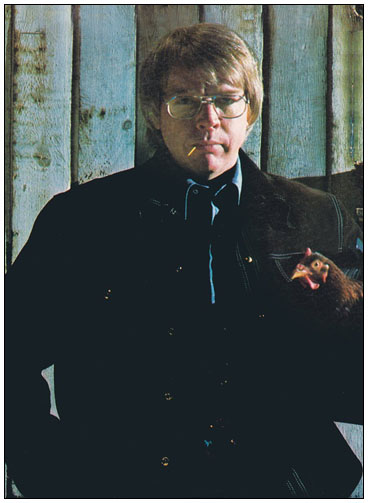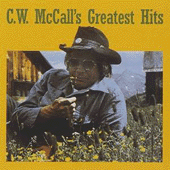|
"Convoy" C. W. McCall MGM 14839 January 1976 Billboard: #1
Still, Americans were chattering away like mad on their CB radios when advertising agency director William Dale (Bill) Fries assumed the identity of C. W. McCall and recorded "Convoy," a novelty song written in CB jargon. An English-speaking person not familiar with CBs might have assumed the song was written in a foreign tongue. Fries was working at the Bozell and Jacobs advertising agency in Omaha when he created the character of "C. W. McCall" for an ad campaign for the Mertz Baking Company of Iowa. The campaign won a Cleo Award and was so popular, Fries recorded the commercial's theme song, "Old Home Filler-Up an' Keep-on-a-Truckin' Cafe" and released it on a label he owned with partner Don Sears. After they sold 30,000 copies in three weeks, MGM Records picked up the song for national distribution and signed "C. W. McCall" to a recording contract. Another single, "Wolf Creek Pass," went to number 40 in the spring of 1975. That June, Fries was listening to CB while driving his jeep when a road sign inspired him to write the lyrics to "Convoy." Released the following winter, "Convoy" entered the Billboard Hot 100 on December 6, 1975, at number 92 and moved to number one just five weeks later. It was the 16th and final number one song released on MGM records. The label was purchased by Polygram Records and was used infrequently, mostly for soundtracks and adult contemporary artists like Jack Jones. "Convoy" was irresistible enough to climb the charts in many other countries besides the United States. The tale of the "rubber duck" went to number two in Britain, long before CB radios were introduced in that country. "Convoy" also sold well in Canada, Australia and South Africa. Fries was born November 15, 1928, in Audubon, Iowa. He played in the band at the University of Iowa, but became more interested in commercial art and went to work as a set designer at a local television station. He kept his job at the ad agency, a clever move considering that after "Convoy" he only made the Billboard Hot 100 one more time: the environmental anthem "There Won't Be No Country Music (There Won't Be No Rock 'n' Roll)" went to number 73 in the spring of 1976. However, he would score a handful of additional hits on the Country charts during a career with a total nine studio albums to his credit. In the early '80, Fries dabbled in politics and was elected mayor of Ouray, Colorado. He died of cancer on April 1, 2022 at the age of 93. - Fred Bronson, The Billboard Book of Number One Hits, Billboard, 1988.
No comments so far, be the first to comment. |


